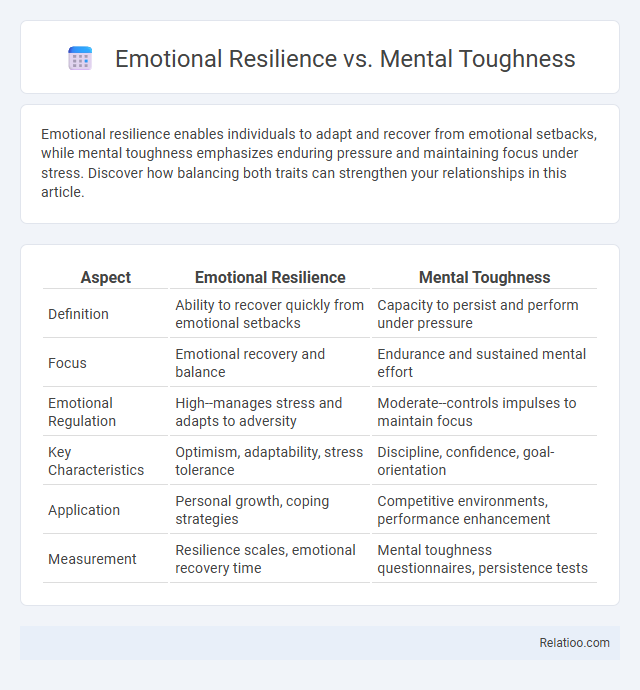Emotional resilience enables individuals to adapt and recover from emotional setbacks, while mental toughness emphasizes enduring pressure and maintaining focus under stress. Discover how balancing both traits can strengthen your relationships in this article.
Table of Comparison
| Aspect | Emotional Resilience | Mental Toughness |
|---|---|---|
| Definition | Ability to recover quickly from emotional setbacks | Capacity to persist and perform under pressure |
| Focus | Emotional recovery and balance | Endurance and sustained mental effort |
| Emotional Regulation | High--manages stress and adapts to adversity | Moderate--controls impulses to maintain focus |
| Key Characteristics | Optimism, adaptability, stress tolerance | Discipline, confidence, goal-orientation |
| Application | Personal growth, coping strategies | Competitive environments, performance enhancement |
| Measurement | Resilience scales, emotional recovery time | Mental toughness questionnaires, persistence tests |
Understanding Emotional Resilience
Emotional resilience refers to the ability to adapt positively to stress, adversity, and trauma by effectively managing emotions and recovering from setbacks. Unlike mental toughness, which emphasizes perseverance and grit in facing challenges, emotional resilience centers on maintaining emotional balance and flexibility under pressure. Understanding emotional resilience involves recognizing how emotional regulation, self-awareness, and social support contribute to sustained psychological well-being and adaptive coping strategies.
Defining Mental Toughness
Mental toughness refers to the psychological edge that enables individuals to cope effectively with stress, pressure, and adversity, maintaining focus and determination to achieve goals. Unlike emotional resilience, which emphasizes recovering from emotional setbacks, mental toughness involves sustained motivation, confidence, and control over thoughts and emotions in challenging situations. This trait is crucial for athletes, leaders, and professionals who face high-stakes environments requiring consistent performance and mental endurance.
Core Differences Between Emotional Resilience and Mental Toughness
Emotional resilience refers to the ability to adapt and recover quickly from emotional setbacks, while mental toughness encompasses a broader capacity to endure stress, pressure, and adversity without losing focus or motivation. Unlike mental toughness, which emphasizes sustained performance and persistence, emotional resilience focuses on managing emotional responses and maintaining psychological well-being during challenges. Key differences include the adaptive emotional regulation in emotional resilience versus the goal-oriented perseverance characteristic of mental toughness.
Key Attributes of Emotionally Resilient Individuals
Emotionally resilient individuals demonstrate adaptability, effective stress management, and strong self-awareness, enabling them to recover quickly from setbacks and maintain emotional balance. They exhibit emotional regulation, optimism, and the capacity for empathy, which distinguish them from merely mentally tough individuals who primarily rely on grit and endurance. Core attributes include flexible thinking, social support utilization, and proactive coping strategies, which enhance overall emotional well-being and resilience in the face of adversity.
Essential Traits of Mentally Tough People
Mental toughness involves essential traits like unwavering determination, adaptability, and the ability to manage stress effectively, setting it apart from emotional resilience, which centers on recovering from emotional setbacks. Emotionally resilient individuals bounce back quickly from difficulties, maintaining a positive outlook, but mentally tough people consistently push through obstacles by embracing challenges and sustaining focus under pressure. Your growth in mental toughness depends on cultivating perseverance, self-confidence, and emotional regulation to navigate adversity with strength and composure.
The Role of Emotional Intelligence in Resilience
Emotional intelligence plays a crucial role in both emotional resilience and mental toughness by enabling individuals to recognize, understand, and manage their own emotions as well as empathize with others. High emotional intelligence fosters adaptive coping strategies that enhance emotional resilience, allowing individuals to bounce back from stress and adversity effectively. In contrast, mental toughness emphasizes perseverance and commitment under pressure, but emotional intelligence integrates self-awareness and emotional regulation, which are essential for sustained resilience in challenging situations.
Stress Management: Resilience vs Toughness Approaches
Emotional resilience involves adapting to stress by maintaining emotional balance and recovering quickly from adversity, while mental toughness emphasizes enduring pressure through sustained focus and control. Stress management in resilience focuses on flexibility and emotional regulation to bounce back from challenges, contrasting with toughness strategies that prioritize persistence and discipline under high-stress conditions. Both approaches contribute to effective stress handling but differ in their mechanisms: resilience enhances recovery and adaptability, whereas toughness strengthens resistance and persistence.
Building Emotional Resilience: Practical Strategies
Building emotional resilience involves developing coping skills that help you recover from stress and adversity quickly while maintaining mental toughness, which is your ability to stay focused and disciplined under pressure. Practical strategies include practicing mindfulness to increase self-awareness, cultivating a support network for emotional backing, and engaging in regular physical exercise to boost mood and reduce anxiety. Strengthening your emotional resilience empowers you to navigate challenges more effectively, enhancing both your psychological flexibility and mental endurance.
Developing Mental Toughness: Actionable Techniques
Developing mental toughness involves practical strategies such as consistent exposure to challenging situations, goal-setting with incremental milestones, and cultivating a growth mindset to embrace setbacks as learning opportunities. Techniques like visualization, controlled breathing exercises, and self-talk modulation enhance focus and emotional regulation under pressure. Regular practice of these methods builds the capacity to maintain performance and adaptability in high-stress environments.
Choosing the Right Mindset: When to Use Resilience or Toughness
Emotional resilience helps you recover from setbacks by fostering adaptability and emotional regulation, while mental toughness emphasizes perseverance and sustained focus under pressure. Your choice between resilience and toughness depends on the situation: resilience is ideal for managing stress and bouncing back from emotional challenges, whereas toughness suits scenarios requiring grit and unwavering determination. Understanding when to apply each mindset enhances your ability to navigate both personal struggles and high-stress environments effectively.

Infographic: Emotional Resilience vs Mental Toughness
 relatioo.com
relatioo.com